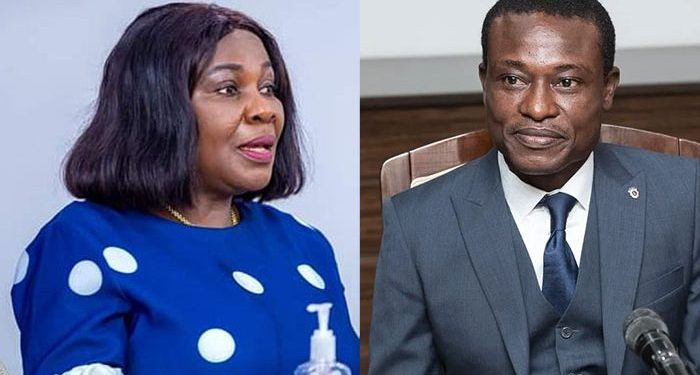
The Office of the Special Prosecutor (OSP) has denied assertions that it exonerated former Sanitation Minister Cecilia Dapaah before transferring her case to the Economic and Organized Crime Office (EOCO).
Cecilia Dapaah was under investigation by the OSP for alleged corruption and corruption-related offenses following reports that their domestic staff had stolen millions of local and foreign currencies, as well as other personal belongings belonging to the former minister and her husband.
After several months of investigation, the OSP closed its case its case and transferred it to EOCO, citing that the offenses primarily pertained to money laundering.
The Office mentioned that it might reopen the case if additional evidence supporting corruption investigations emerges.
However, EOCO forwarded the OSP’s transferred docket to the Attorney General’s office for guidance on whether to proceed with investigations or not.
The AG’s Office advised EOCO to stop investigations EOCO to halt investigations, citing the absence of an investigative report and additional documentation to support a money laundering prosecution.
Furthermore, the AG stated that the police were already probing the source of funding by Madam Cecilia Dapaah, hence EOCO’s continuation with the case was deemed unnecessary.
In a separate statement, the Attorney General’s office accused the OSP for not furnishing EOCO with adequate information regarding its collaboration with the Federal Bureau of Investigations (FBI) to facilitate further investigations.
In an interview with Joy News over the weekend, Mr. Samuel Appiah Darko, the Director for Strategy, Research, and Communications at the OSP, clarified that his office did not absolve Cecilia Dapaah of corruption-related offenses.
He explained that the OSP closed its investigation after determining that the offense primarily involved money laundering. Furthermore, it was observed that Madam Dapaah could not provide satisfactory explanations for all the seized funds from her home, as the responses were deemed untrue after investigations.
Mr. Darko emphasized that EOCO did not request the FBI investigation report, despite the presence of joint representatives from both agencies involved in the file transfer.
“We want to make it very clear that EOCO did not request for the FBI report. Even if they did, the FBI report has a lot of confidentiality clauses that were directed particularly to the OSP and you can’t just give it to another agency because you have transferred the case. There ought to be a lot of inter-agency collaboration and clearance. So if it had happened, we may have triggered the clearance clauses so that either we are cleared by FBI or FBI sends the report directly to EOCO.”
He clarified that the OSP forwarded the case to EOCO along with comprehensive documentation, including caution statements obtained from over 20 suspects in America, Accra, and Kumasi.
Additionally, the documentation contained other pertinent information, such as statements from relatives of Madam Dapaah asserting that the funds and certain jewelry found in her residence were family heirlooms.
These materials were provided to aid EOCO in conducting its own autonomous investigation into the financial transactions under scrutiny.
“The OSP should be considered as a whistleblower to EOCO. So as a whistle-blower, we gave EOCO platinum information. Ordinarily, you will not even find other agencies giving such information to EOCO,” Mr. Darko noted in the interview.
The OSP’s Director for Strategy, Research, and Communications elaborated on the rationale behind the decision to refer the case to EOCO instead of pursuing the purported money laundering probe further.
“Our referral is not just in respect of a transaction in America. Also, we were not conducting money laundering investigation, we were conducting corruption investigation. We are of the opinion that, we had all it takes to send that referral to EOCO because there was no way we could have proceeded and then investigated and write a report on money laundering and send it to EOCO for onward transfer to the Attorney General. We only referred a matter to EOCO as whistle-blowers for EOCO to investigate…We cannot instruct EOCO on what they should do,” he added.












